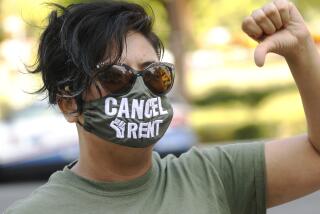Supreme Court to Rule on Liability for Harassment
- Share via
WASHINGTON — The Supreme Court announced Friday that it will decide when companies or other employers can be held liable for workplace sexual harassment perpetrated by one of their supervisory employees.
A ruling on the issue, expected in the spring, could have a broad impact on both employers and workers.
It could be an expensive loss for employers if the court says that they must pay damages whenever one of their workers is seriously harassed on the job.
However, lawyers for victims said that on-the-job harassment will not stop until employers, as well as individual perpetrators, are forced to pay.
It is generally understood that workplace sexual harassment that is “severe and pervasive” violates federal law, even if the victim is not directly punished, such as by firing, for refusing a supervisor’s advances. In the landmark 1986 case of Meritor Savings vs. Vinson, the Supreme Court adopted the view that this sort of “hostile environment” violates the federal law that forbids sex discrimination in the workplace.
However, the justices sidestepped the question of whether the company, as well as the individual harasser, must pay damages in such cases.
In response to the ruling, most employers adopted policies that forbid physical or verbal harassment of their employees. They also informed workers of whom they should tell if they have a complaint about on-the-job harassment.
But instances of harassment did not stop. Indeed, the number of complaints and lawsuits rose sharply after the televised 1991 hearings on Clarence Thomas’ nomination to the Supreme Court highlighted law professor Anita Faye Hill’s allegations of harassment. Separately, Congress amended the civil rights laws in 1991 to allow damage claims of up to $300,000 for workplace discrimination.
Faced with a deluge of new lawsuits, courts across the country have split badly on when employers can be held liable for workplace sexual harassment that occurs without their knowledge.
Some have said that employers usually must pay when a worker is harassed by a supervisor. Under this theory, since the companies choose the supervisors, they are responsible for their misbehavior.
Other courts have shielded employers. These judges say that companies should not be held liable for damages unless their top officials knew of the harassment and did nothing.
On Friday, the high court agreed to hear the case of a Florida lifeguard who said that she was touched and grabbed by two male supervisors. She lost when she sued the city of Boca Raton.
While the city had an official policy forbidding workplace harassment, its female lifeguards said that they had no one to complain to about their supervisors.
Nonetheless, the U.S. court of appeals in Atlanta said that the city was not liable because the two male supervisors were “stepping outside the scope of their employment” when they harassed female lifeguards.
A lawyer for the former lifeguard, Beth Ann Faragher, said that this rule, if adopted nationwide, would leave victims with little or no chance to recover real damages for harassment suffered on the job.
The justices will hear arguments in the case (Faragher vs. Boca Raton, 97-282) in late February and issue a ruling by the summer.
More to Read
Inside the business of entertainment
The Wide Shot brings you news, analysis and insights on everything from streaming wars to production — and what it all means for the future.
You may occasionally receive promotional content from the Los Angeles Times.











